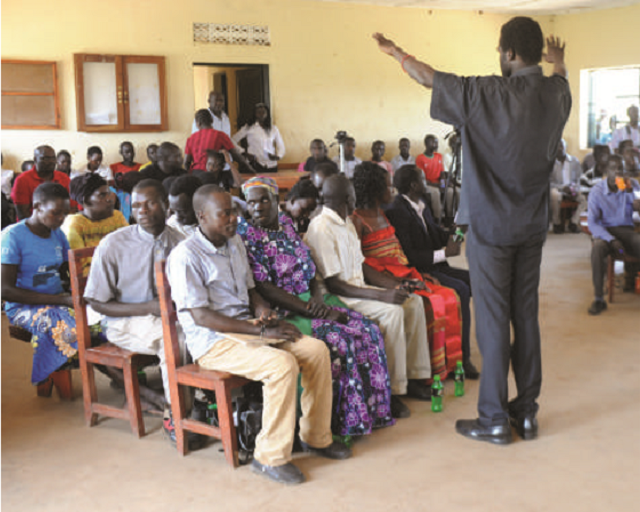
Poorly conceived programmes
Although the government, and President Yoweri Museveni in particular, have placed OWC on a pedestal as the premium program for fighting poverty at the household level, its implementation over its three year lifespan so far has floundered at the local government level. Although the government has pumped billions of shillings into OWC, there often is little to show on the ground. The top officials scheme off most of the money and distribute either substandard or unwanted inputs, leaving farmers and district officials in a lurch.
Another top programme the government wants rolled out to spur economic growth at the local government level has a fancy acronym; LED. It stands for Local Economic Development (LED) and is built around partnerships between local government, the private sector in their area, and the community to mobilise resources to put more money into the hands of residents. It could involve levying local government taxes and undertaking local government level economic investments.
The Minister of State for Local government, Jennifer Namuyangu, told the district leaders that the LED program is to be the flagship programme of the local government in the next five years. Although she and a handful of other ministry officials encouraged CAOs to write proposals to have their LED programs funded, they received only lukewarm responses. Later it emerged that there is very little understanding of the LED framework.
Grace Kisembe, the CAO of Otuke district, said the LED program has failed to take off partly because of poor conceptualisation from the central government.
Even Ekachelau, the CAO of Butaleja who has served in several districts in the same position says he is not fully conversant with the LED program partly because of poor coordination by government.
The Masaka CAO, who appeared to partly understand it, said the LED program had stalled at the district level because there was no funding for it.
Jonas Mbabazi who works with the research firm, Action Coalition for Development and Environment and has done work on assessing local government performance says LED is one of the six objectives of decentralisation but has doubts about it in the long run.
“Local governments have grappled with poor financing yet the LED program tasks them with coming up solutions to create vibrant enterprises and raise taxes. These programs have largely depended on donor support but sometimes the donors may not be interested in supporting them.
He says even if the donors took interest, they may not have the resources to see it rolled out across the country. Mbabazi told The Independent that LED ideally is about supporting a value chain. “For instance in bee keeping, the issue should be, is there a conducive environment for the business, so that there can be a method for supporting the processing, packaging etc. It should essentially be about supporting the value chain from the grower to the final consumer.”
“It all depends on the area; certain business can flourish in one region. It’s about developing the market in an area and supporting existing local economies to help local governments,” he said.
Problems of bureaucracy
As a result of such disconnects, possibly, Beatrice Byarugaba; the Acting Director Agricultural Extension Services at the Ministry of Agriculture, faced a barrage of questions from the CAOs at the meet.
William Kanyesigye, the Masaka District Chief Administrative Officer told her that the government needs to provide and support agricultural extension officers. He said paying extension officers Shs87, 000 every quarter is an unfunny joke.
“How do you expect output?” he said.
Another CAO spoke about the need for proper guidelines on how OWC in-puts should be distributed to farmers.
“There is trouble about the distribution, seedlings especially because there are no clearly laid down procedures over what should go to how many people,” he said, “As CAO when you try to intervene, you are accused of being an impediment in the process.”
Yet another CAO blamed the top-bottom bureaucracy of the government. For illustration, the CAO described how each district has a veterinary principle, an agricultural principle, an entomologist, and more.
“We still have a heavy structure that is slowing progress. All these want to impose their authority. Why can’t we have one officer who can superintend over all these officers so that even with the little resources we have, we are not delayed by the many decisions of these experts?”
For the town clerk of Entebbe, the biggest problems are the high level of disinterest and lack of professionalism.
Faced with the barrage of frustrated illustrations, Byarugaba’s answers were few and far between. She said since the district should intervene in neglected areas like the extension services support. Regarding the thick layers of bureaucracy, she said they are approved at ministry level and would require a government review, especially for small districts. She appeared to back the CAOs view when she said that, in any case, they “just pile on the wage bill”.
Byarugaba who worked for many years at the Local Government says that the poor attitude exhibited by today’s agricultural extension workers is a result of the poor training of civil servants.
****
editor@independent.co.ug
 The Independent Uganda: You get the Truth we Pay the Price
The Independent Uganda: You get the Truth we Pay the Price





